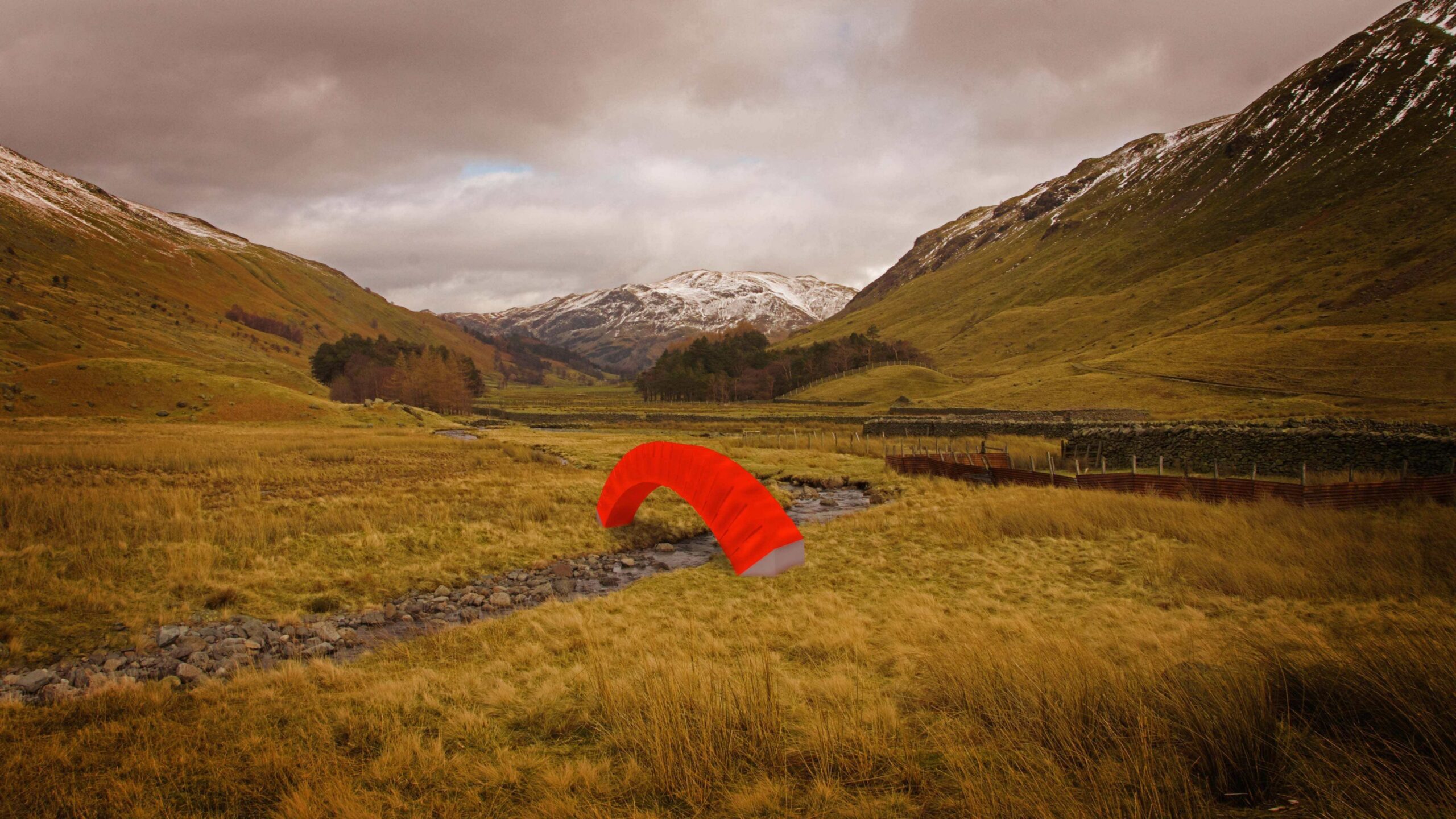
Paper Bridge by Steve Messam, part of the Lakes Ignite festival
Lakes, mountains and the arts
Is there a need for ‘Cultural Destinations’ funding in the Lake District, a region already full of tourists? Definitely, says Richard Foster.
In many ways the Lakes was the UK’s first cultural destination. It was the Lake District landscape which informed William Gilpin’s first essay on the picturesque, which in turn resulted in the first guide book to the Lakes, written by Thomas West in 1778, where the author sought to find parallels between the paintings of Claude Lorrain and locations in the Lakeland hills. Since then innumerable artists and writers, from William Wordsworth to Kurt Schwitters and Andy Goldsworthy, have found creative inspiration from the hills and in turn inspired millions of visitors from across the globe to visit this region.
So why the need for VisitEngland and Arts Council England to fund a Cultural Destinations project which seeks “to establish the Lake District as the UK’s leading rural cultural destination”? Isn’t that an argument that was won 200 years ago?
We seek to inspire the tourism sector to see cultural tourists as a high-spending and motivated emerging market
Well, I would argue that it’s a message that has been rather swamped over the last hundred years, as the Lakes has become the adventure capital of England, fuelled by the millions of walkers, climbers and adrenalin junkies that visit the region for outdoor activities. Ironically the way we appreciate landscapes, particularly mountainous ones, as beautiful and picturesque is a cultural concept, and one which was fully realised in the Lakes. But it’s also a concept which has become commonplace and taken for granted after 200 years. One of the core activities of the Cultural Destinations project is to support the application to UNESCO for registration of the Lake District as a World Heritage Site, under its cultural landscape designation and to use this as a way of attracting overseas visitors to cultural venues in the region. The designation will also re-emphasise the cultural aspects of the region for UK-based visitors and focus their attention on the cultural content of the Lake District.
More pragmatically, the Cultural Destinations project, led by Lakes Culture, a consortium of Lakeland venues and organisations, seeks to bring two closely related but currently separate sectors together in a more symbiotic relationship. For a 200-year-old destination you would imagine that tourism and the arts would be working hand in glove – and in some ways this is true. Since 1890 the Wordsworth Trust has operated a tourist attraction based around Wordsworth’s home, and the income from visitors supports its work as a centre for Romanticism and contemporary poets. Other cultural organisations, such as the Theatre by the Lake in Keswick, the Lakeland Arts Trust’s galleries at Abbot Hall in Kendal and Blackwell Arts and Crafts House in Bowness-on-Windermere, behave in a similar way, offering innovative and high-quality activity funded in part by the visitor pound. However, the Cultural Destinations project seeks to bring this close working relationship into play across the Lakes. We seek to inspire the tourism sector to see cultural tourists as a high-spending and motivated emerging market that will support a wide range of businesses (accommodation, retail, transport) and increase their resilience.
Indeed, our research shows that cultural tourists spend almost twice as much and stay longer than the average visitor to the Lakes. Additionally, we seek to convince arts and cultural venues that along with local residents, visitors offer an additional audience that is keen to engage with their arts programme, again supporting their business resilience in an era of reduced funding. To this end, the Cultural Destinations project commissioned Blue Sail Consulting to review the current cultural tourism offer and its potential for growth. The research has been distilled into a Strategy for Cultural Tourism in the Lakes, which forms the blueprint of our three-year project. Additionally, a brand story, created with Blue Sail emphasises the quality and uniqueness of the contemporary cultural offer in the Lake District, inspired by its location – a story which Lakes Culture seeks all organisations to adopt, adapt and disseminate to potential visitors and industry partners alike.
This task is supported by an online toolkit available to all tourism partners. Partnership is at the heart of the project between the ten organisations which comprise Lakes Culture, but especially with Cumbria Tourism (CT), the region’s destination management organisation. CT provides the link between the tourism and cultural sectors and it will be the inheritor of results and developments brought about by the three-year Cultural Destinations project. It supports the brand message in the wider activity and has been commissioned to deliver a range of marketing and PR initiatives. It also provides informed research activity for the project and its website is at the heart of the process of converting potential tourists into actual visitors.
But along with supporting the financial resilience of cultural and tourism businesses, I believe this activity generates opportunities to create and celebrate new work which is unique and particular to its location. Individual venues like my own, the Brewery Arts Centre in Kendal, have used our location to challenge artists to create new and particular work, including New York-based hip hop dance company Decadancetheatre, which created a new work during its residency in the Lakes, in part as a response to the landscape around them. Lakes Culture is reinforcing this message with four new commissions during its Lakes Ignite festival.
So cultural tourism has a significant role to play in the Lakes. Visitors have and will continue to contribute to our financial resilience and our creative ambitions. Equally, new art will continue to be created which both challenges and celebrates our unique location.
Richard Foster is Artistic Director of the Brewery Arts Centre, Kendal.
www.breweryarts.co.uk
Join the Discussion
You must be logged in to post a comment.